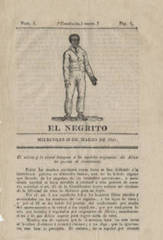
This a short, four page periodical from 1821, written by Juan Jose de Leon, a Cuban writer from that time; unfortunately, there was no other information available about the author or other works. This work falls in what Chasteen identifies as the Independence period of Latin American history, however, it doesn’t discuss independence from Spain at all. The title, El Negrito, translates to “The Blackie”, which has an obvious racist connotation. This writing accurately displays the feelings towards black people in Cuba at the time, as slavery was legal and roaring. Like in most Latin American countries, sugarcane was an extremely profitable crop in Cuba and slave labor was used on plantations to produce mass quantities of it.
Despite the title, slaves are not the entire focus of the paper. Much of it deals with constitutions and citizenship. In a time where Latin American countries were eager to become independent from Spanish rule, Jose de Leon praises the Spanish society because of their ability to “sustain themselves in a such a brilliant state”. Alongside the Spanish praise, Jose de Leon denounces the rights of black people due to the fact they are slaves. Cuba was one of the last countries in Latin America to have slavery abolished, so this piece of writing is very relevant to the attitudes in Cuba and it exemplifies how the enslaved were viewed by the free.
Works Cited:
Chasteen, John Charles. Born in Blood and Fire. 4th edition. New York: W.W. Norton, 2016.
Jose de Leon, Juan. “El Negrito“.
By Shane Wallace
